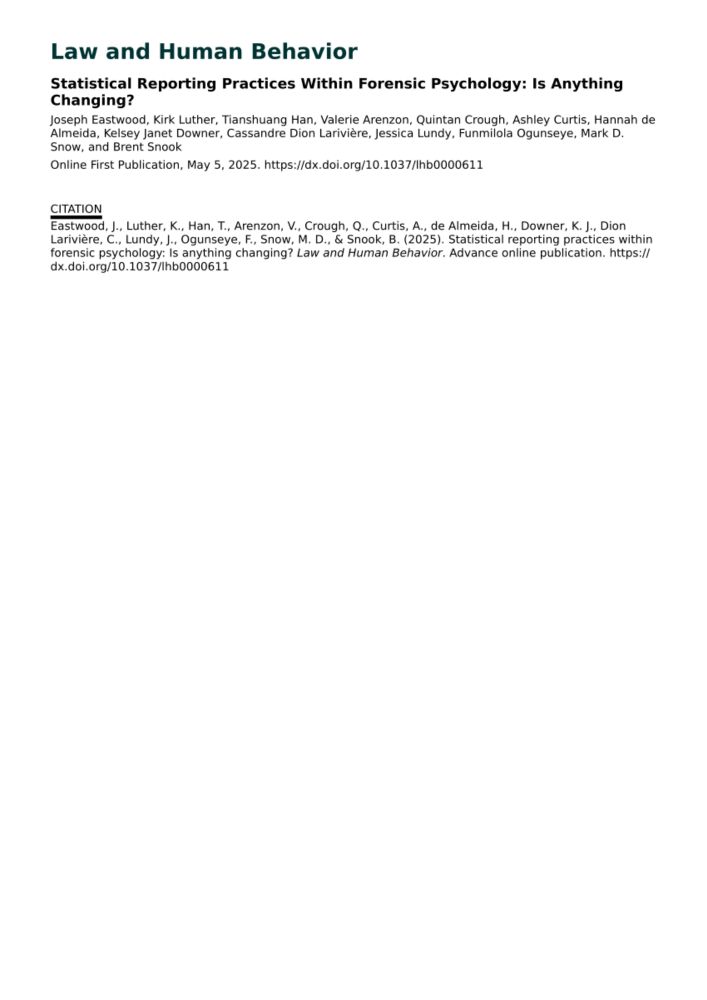
MUN Psych & Law Lab
@munpsychlawlab.bsky.social
Tweeting the importance of research on human behaviour in the criminal justice system. Improving justice administration through applied research and training.
The ultimate responsibility of scientists is to uphold and speak for the truth, no matter ideological leanings. Regardless of how often and how loudly one repeats a lie—in some cases, lying about lie detection—it will not become the truth, and we should not surrender.
July 30, 2025 at 4:51 PM
The ultimate responsibility of scientists is to uphold and speak for the truth, no matter ideological leanings. Regardless of how often and how loudly one repeats a lie—in some cases, lying about lie detection—it will not become the truth, and we should not surrender.
It is imperative that scientists not remain silent on “controversial” issues to maintain an appearance of being neutral, or say, apolitical. Nor should they give in to political censorship or censor themselves due to dogmatism.
July 30, 2025 at 4:51 PM
It is imperative that scientists not remain silent on “controversial” issues to maintain an appearance of being neutral, or say, apolitical. Nor should they give in to political censorship or censor themselves due to dogmatism.
Forewarning on fake debates was found to have minimal effect. Although our forewarning fell short in countering the power of false balance to overshadow consensus data, a glimpse of hope lies in communicating these descriptive norms, which indeed deliver empirical facts to people
July 30, 2025 at 4:51 PM
Forewarning on fake debates was found to have minimal effect. Although our forewarning fell short in countering the power of false balance to overshadow consensus data, a glimpse of hope lies in communicating these descriptive norms, which indeed deliver empirical facts to people
Results showed people intuitively believe nonverbal cues reliably indicate deceit. Even after learning expert consensus is that nonverbal lie detection is futile, balanced comments reduced their perceived expert consensus and policy support for discarding such practices.
July 30, 2025 at 4:51 PM
Results showed people intuitively believe nonverbal cues reliably indicate deceit. Even after learning expert consensus is that nonverbal lie detection is futile, balanced comments reduced their perceived expert consensus and policy support for discarding such practices.
Following the data, they read either no comments from experts, balanced comments (3 from each expert on opposing sides), evidentiary balanced (5 from a deception detection expert and 1 from a contrarian expert), or same opposing comments with a forewarning (3:3 + fore; 5:1+fore)
July 30, 2025 at 4:51 PM
Following the data, they read either no comments from experts, balanced comments (3 from each expert on opposing sides), evidentiary balanced (5 from a deception detection expert and 1 from a contrarian expert), or same opposing comments with a forewarning (3:3 + fore; 5:1+fore)
We recruited members of the public, first asked their beliefs in nonverbal lie detection, and then had them read one of five versions of a media report indicating nearly 90% surveyed experts agreed that nonverbal cues are unreliable indicators of deception.
July 30, 2025 at 4:51 PM
We recruited members of the public, first asked their beliefs in nonverbal lie detection, and then had them read one of five versions of a media report indicating nearly 90% surveyed experts agreed that nonverbal cues are unreliable indicators of deception.
Therefore, we examined if false balance (fake debate) distorts people’s estimation of expert consensus pertaining to non-verbal lie detection, even after viewing the data. More importantly, we tested whether forewarning people about a fake debate protects them against harm.
July 30, 2025 at 4:51 PM
Therefore, we examined if false balance (fake debate) distorts people’s estimation of expert consensus pertaining to non-verbal lie detection, even after viewing the data. More importantly, we tested whether forewarning people about a fake debate protects them against harm.
The disproportionate hype around body language and microexpressions in lie deception creates a illusion of controversy. Fake experts also fuel fake debates, making misinformation on par with scientific facts and imposing a dangerous false balance.
July 30, 2025 at 4:51 PM
The disproportionate hype around body language and microexpressions in lie deception creates a illusion of controversy. Fake experts also fuel fake debates, making misinformation on par with scientific facts and imposing a dangerous false balance.
One of the most contentious topics is nonverbal lie detection. There is strong scientific consensus that nonverbal cues cannot reliably detect lies. However, the fringe notion of nonverbal lie detection has permeated pop culture, media, and remains popular among practitioners.
July 30, 2025 at 4:51 PM
One of the most contentious topics is nonverbal lie detection. There is strong scientific consensus that nonverbal cues cannot reliably detect lies. However, the fringe notion of nonverbal lie detection has permeated pop culture, media, and remains popular among practitioners.
Misinformation spans various societal issues and domains, including deception detection. Despite substantial empirical evidence on what works, this high-stake area remains riddled with misconceptions and deceitful practices about how to catch a liar.
July 30, 2025 at 4:51 PM
Misinformation spans various societal issues and domains, including deception detection. Despite substantial empirical evidence on what works, this high-stake area remains riddled with misconceptions and deceitful practices about how to catch a liar.
What if we view misinformation as an errant golf ball? Does shouting fore before it reaches people protect them against nonsense. Do scientists have an obligation to try to protect people by shouting out for warnings?
July 30, 2025 at 4:51 PM
What if we view misinformation as an errant golf ball? Does shouting fore before it reaches people protect them against nonsense. Do scientists have an obligation to try to protect people by shouting out for warnings?
A common practice in golf is for players to shout fore when an errant ball is heading towards others. This simple act is significant as it protects others from getting injured and it’s a form of insurance to show that the ball striker made every effort to protect someone else.
July 30, 2025 at 4:51 PM
A common practice in golf is for players to shout fore when an errant ball is heading towards others. This simple act is significant as it protects others from getting injured and it’s a form of insurance to show that the ball striker made every effort to protect someone else.
Full text see www.researchgate.net/publication/...

Statistical Reporting Practices Within Forensic Psychology: Is Anything Changing? | Request PDF
Request PDF | Statistical Reporting Practices Within Forensic Psychology: Is Anything Changing? | Objective: We examined the evolution of statistical reporting practices within forensic psychology acr...
www.researchgate.net
July 5, 2025 at 1:11 PM
Full text see www.researchgate.net/publication/...
Cohen (1994) and Gigerenzer (2004) called for using an array of statistical tools with informed judgment. We continue to reiterate the need for forensic psych researchers to move beyond NHST and apply all tools critically to ensure our science rest on a solid foundation.
July 5, 2025 at 1:11 PM
Cohen (1994) and Gigerenzer (2004) called for using an array of statistical tools with informed judgment. We continue to reiterate the need for forensic psych researchers to move beyond NHST and apply all tools critically to ensure our science rest on a solid foundation.
So, a short answer to our question: there is a somewhat, but superficially uptake of stats reform in forensic psychology. Despite an increase in reporting of ESs and CIs, these values were often reported with no further interpretation and the field remain strongly reliant on NHST.
July 5, 2025 at 1:11 PM
So, a short answer to our question: there is a somewhat, but superficially uptake of stats reform in forensic psychology. Despite an increase in reporting of ESs and CIs, these values were often reported with no further interpretation and the field remain strongly reliant on NHST.

